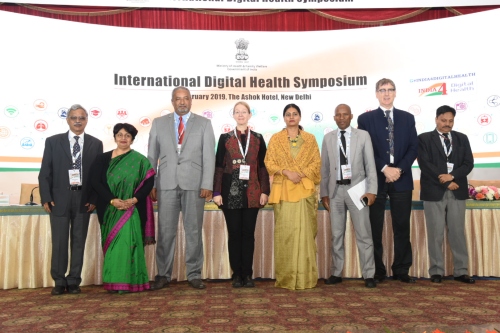27 February 2019

The International Digital Health Symposium and Exhibition was organised on 27 February 2019 at The Ashok Hotel, New Delhi by the Ministry of Health & Family Welfare, Government of India.
In her inaugural address, Ms Anupriya Patel, Minister of State for Health & Family Welfare said, “India has taken the digital inclusion approach to ensure all levels of health services and to include appropriate digital health interventions.” Ms. Patel also inaugurated the exhibition on Digital Health as part of the Symposium, where participant countries along with various Government Ministries, states and other stakeholders showcased key innovations, implementation experiences and innovative Digital Health Interventions.
Mr Upendra Yadav, Deputy Prime Minister and Minister for Health, Nepal, Dr Arlindo Nascimento do Rosário, Minister of Health, Cape Verde, Dr Ulana Suprun, Minister of Health, Ukraine Mr Faizal Cassim, Deputy Minister of Health, Nutrition and Indigenous, Sri Lanka, Dr. Shah Mahir, State Minister of Health, Maldives also graced the inaugural session and reiterated their commitment towards the digital health agenda.
Dr V K Paul, Member, NITI Aayog said, “India shall soon be unveiling the India’s National Health stack and is focused on creating digital revolution encompassing national nutrition mission, telemedicine and other interventions with focus on aspirational districts.”
Dr Poonam Khetrapal Singh, Regional Director, WHO, South-East Asia Region stated that, “WHO will facilitate the collaboration and to establish specific mechanism to centrally coordinate digital health to assist among key stakeholders in member states for sustainable introduction of digital technologies and maximize the use of digital health.”
Ms Preeti Sudan, Secretary (Health) said, “The international symposium organised today further builds to discuss the impact of digital technologies on health systems and health services delivery.”
Dr Henk Bekedam, the WHO Representative to India, who chaired a panel discussion on Digital Health for the life course (Maternal & Child Health) said,’ “Digital health is a core element of WHO’s new organizational structure and an important agent for advancing public health. WHO is committed to working with countries to accelerate the use of digital health interventions in advancing the efforts to strengthen primary healthcare, universal health coverage and health-related sustainable development goals.”
The symposium provided participants with a platform for vibrant exchange of knowledge, ideas and new-age innovations in the domain of digital health. The key sessions focused on futuristic health systems; challenges in health IT sector; privacy and security in the digital arena; Aadhaar (a unique identity number that can be obtained by residents of India) and national health stack; innovation ecosystem, start-ups and artificial intelligence (AI) for digital health innovations. The national health information systems, digital health financing, health surveillance system and public-private partnerships were also covered to ensure clear outcomes and a road map for policy-level interventions.
